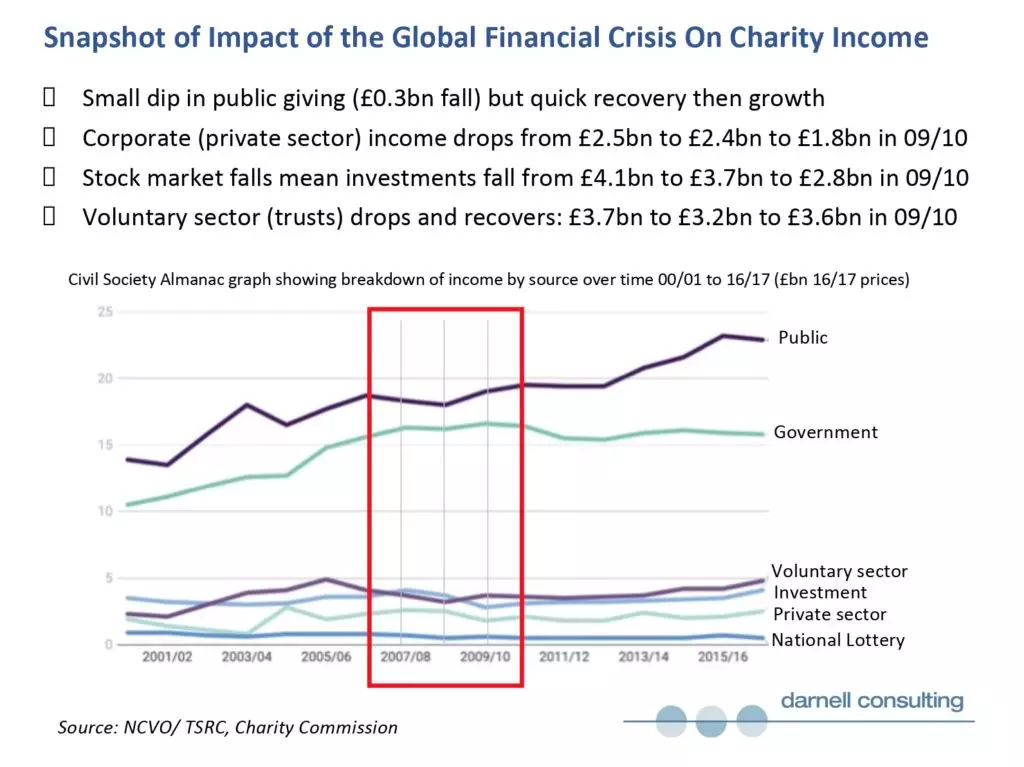COVID-19 crisis: next steps for corporate, philanthropy and trust fundraisers
In any crisis people move through various phases of response. Initially the focus is all on short term measures. There then comes a point when the focus needs to shift from the short term urgency onto the strategic priorities.
The question for fundraising leaders, and especially those looking at corporate, trust and philanthropy income is: how do I balance the short term need for cash with the long term imperatives? This is important because income from corporates, trusts and philanthropists has a typical payback period of 12-18 months i.e. effort now delivers returns a year to a year and a half down the track.
Clearly short term funding opportunities should be sought out. However, if the research effort, pipeline building, and cultivation work is totally parked then this is setting a charity up for a hole in income 12-18 months from now. So the questions are: what actions should be taken to ensure there is still focus on targeting future income? What is the likelihood of that future income being hit by recession?
What can we learn from previous economic shocks?
Over the last week or so many people have been asking what fundraisers can learn from past economic shocks. Lots of charities are looking back at the global financial crisis (GFC) and seeking insight that can inform their actions in response to the current crisis.
The first thing to say in relation to the GFC is that, whilst there are some learning points that we can take from that crisis, and the resulting recession, it is not a like for like comparison. The GFC saw six straight quarters of economic contraction in the UK. This was the worst recession since the war.
The COVID-19 crisis a different beast: a sharp and sudden shut down of the almost the whole economy. So this is leading to a bigger and more immediate drop in GDP but probably only for a short period (see below for some useful resources for tracking recession impact).
In terms of high value income, here is a three bullet summary of what happened after the GFC:
• Major donor income largely held up, in fact some donors increased giving (source: ‘Tomorrow’s Philanthropist’ Barclays Wealth, July 2009)
Advertisement
• Trusts income took a hit as investments lost value due to stock market falls, but then income recovered relatively quickly (NCVO Civil Society Almanac 2017)
• Corporate income took a hit and then remained fairly flat (NCVO Civil Society Almanac 2017). (NB – the GFC hit the banks and finance companies hard and the finance sector accounts for a big portion of corporate giving in the UK)
Below is a snapshot slide summarising the GFC:

Snapshot of the global financial crisis (2001-2016) – source: Grahame Darnell
When considering the likely impact of the current crisis it is important to think look at your income mix. Travel, retail and food services businesses will be hit very hard by this crisis. Businesses in these sectors, or philanthropists that are connected to these businesses, may well reduce their charitable support in the short to medium term. Some will go out of business altogether.
The finance sector, and other services businesses such as law, IT and consulting should not be hit as hard as those aforementioned sectors.
Of course you should treat every company and philanthropist as an individual entity and look into the specific situation they are in. However, if your pipeline is concentrated in just a few areas then now is the time to diversify. I’ve written before about the how services businesses are an important source of support for charities, and where to get information about their giving preferences.

Next steps
Five actions to take now
1. Keep tracking your prospects and supporters
It is vital that you keep abreast of relevant news. Use tools like Google alerts and social media notifications to track stories relating to funders and prospects. Find out how much support is pivoting towards COVID-19 response. We’ve seen a lot of
trusts supporting emergency activity related to the crisis. Decisions trusts are making about who to fund now will affect their capacity to give further down the line. As stated above, look both at industry sectors and at individual companies – how are they being impacted and what does this mean for philanthropists and corporate prospects?
2. Re-prioritise pipeline building
As soon as you can move out of crisis response mode you must refocus on the pipeline. It can be hard to find time for prospect research but this is very important.
Funding preferences will change in the short term and you need to keep up with this; some changes will mean that your cause is deprioritised in favour of those focused directly on the COVID-19 crisis.
Despite this issue, the crisis will also present some opportunities. You will only spot these and be able to act on them if you are looking for new ways to add to your pipeline.
3. Keep focussed on cultivation and stewardship
Cultivating and stewarding relationships will remain vitally important. Even if a supporter or prospect switches their attention away from your charity and focuses on something that is directly related to the COVID-19 crisis, you should keep that relationship alive. If a supporter or prospect is de-prioritising your cause area then show empathy and understanding. Try to keep the relationship warm. At a future date they are likely to come back to their original set of funding priorities and that should mean you are in with a chance of securing income from them once again.
4. Be honest about changing needs
Many charities will have paused or even completely ceased parts of their service delivery. If you have submitted a restricted ask around a project that is paused or no longer happening then all is not lost. Having a timely and honest conversation with the
prospective funder will deliver a decent chance of switching the funding to something else.
Similarly if there is a desperate need for unrestricted money then talk to funders, explain the situation and see whether you can switch any project specific support to unrestricted or part unrestricted (at Darnell Consulting, we’ve seen several clients successfully transition support from being project-specific to unrestricted in the last 10 days).
5. Talk to colleagues and peers
Good communication with colleagues will ensure you keep abreast of changes of internal direction so that you can keep funders informed about progress and impact.
When you are in the office with people you often come across this information more easily. Whilst working remotely you will have to work harder at it. 30 minute update phone calls with colleagues are a good tactic – especially when everyone has video-call fatigue. Also, talking with peers across the sector is a huge stress reliever and can also deliver inspiration and ideas. Make use of formal communities like the IOF Special interest groups as well as spontaneous exchanges over social media – and actual real life conversations by phone.
A useful tool to check out:
PWC – free economic outlook live updates
Grahame Darnell is a fundraising consultant who has worked with charities of all shapes, sizes and causes areas. He has worked in fundraising for over 20 years following the early part of his career working in marketing in the tech sector. Grahame led successful teams when he worked in-house and has a history of driving growth as a director of fundraising.
As a consultant, he has developed fundraising strategies with a range of charities and has a great track record of success. He is highly regarded as a partnerships and philanthropy expert and speaks and blogs regularly on the subject. Twitter: @grahamedarnell





